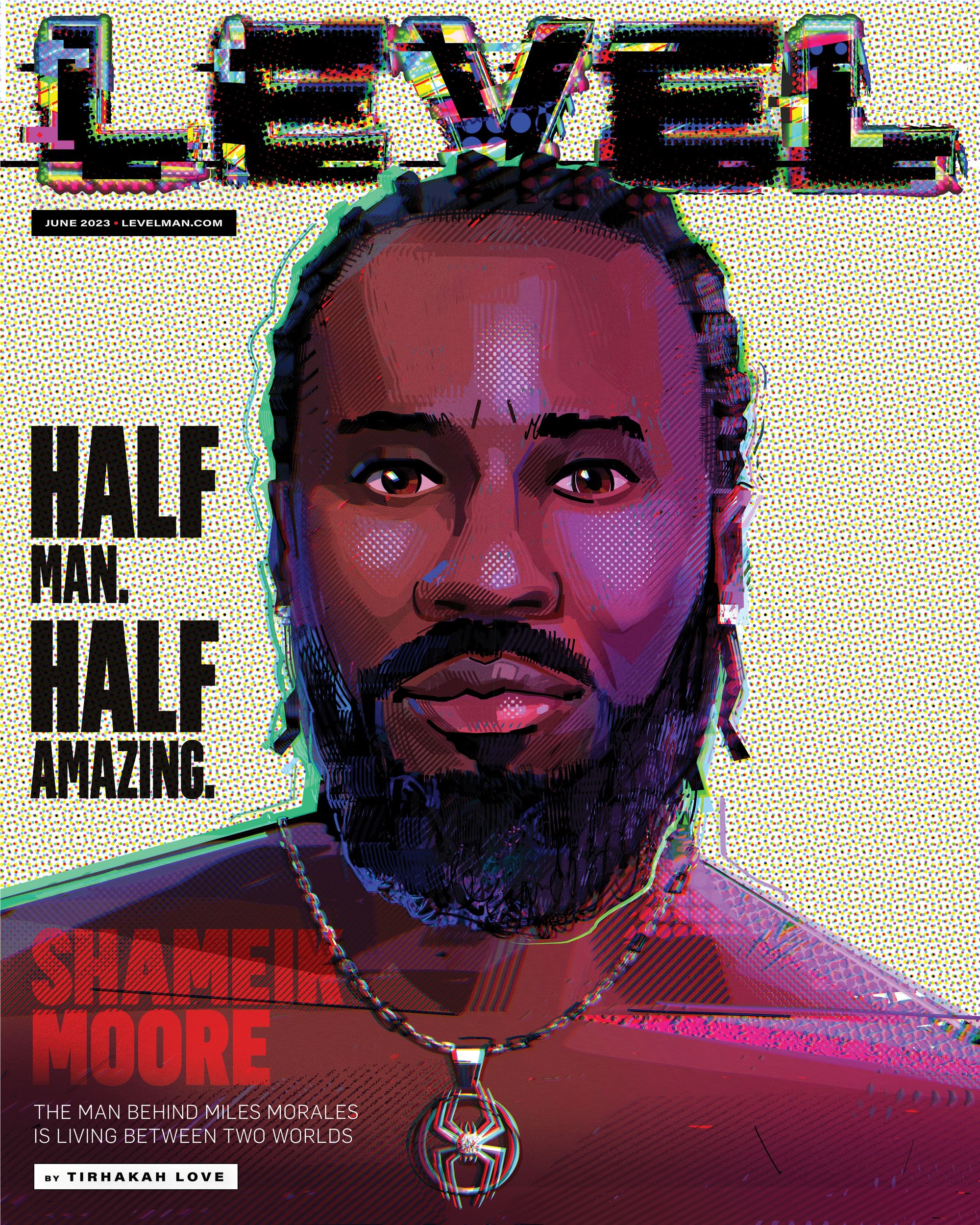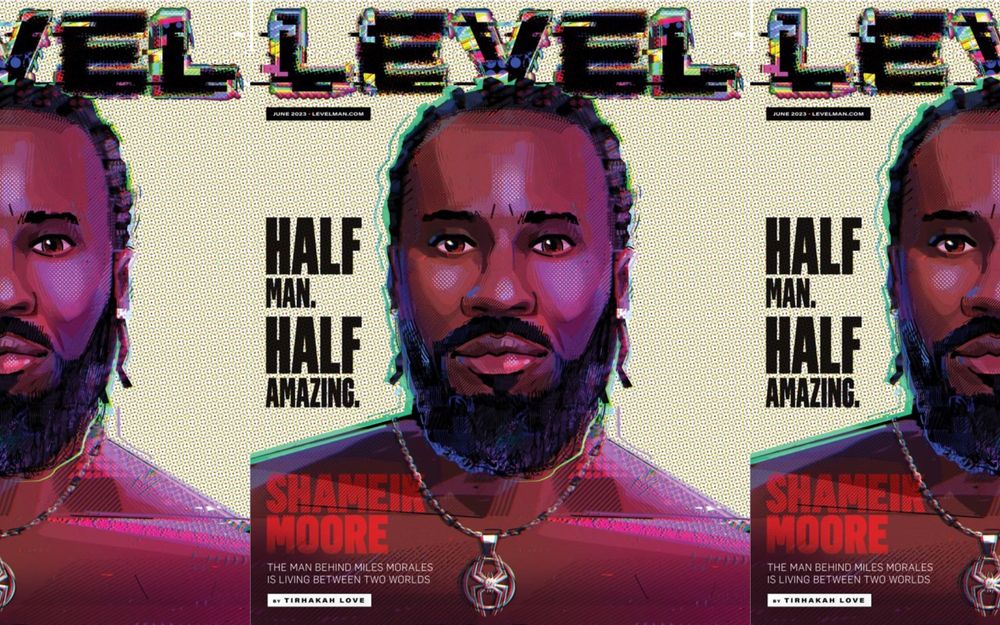Shameik Moore is taking a beat before the flood. It comes like a palpitation, an extrasensory impulse signaling what the nature of his future might be. He’s feeling a bit of anxiety—or maybe that’s just his Spidey Senses tingling. “There’s a lot of projections,” the 28-year-old actor says of the imaginary numbers film industry prognosticators have been throwing his way. “I just want to see, you know, how many people show up—how many people support and actually love this film.”
Moore just arrived in London yesterday for yet another stop on the strenuous press run to promote the animated Spider-Man film Across the Spider-Verse on the day of its wide theatrical release. His slightly modulated voice gives life to teenage protagonist Miles Morales, an Air Jordan-wearing, Afro-Latino Spider-Man in a wild, wild web of Spider-People from various realms of the multiverse. That character (whose debut appearance in Marvel comics dates back to 2011) made his big-screen debut in 2018’s Spider-Man: Into the Spider-Verse, an Oscar-winning moneymaker that created the kind of anticipation that could even make a rising Hollywood star like Moore apprehensive about how its sequel might be received.
Of course, Moore’s concerns are unwarranted. Across the Spider-Verse grossed $208 million worldwide in its opening weekend. The motion picture boasts a 96 percent Rotten Tomatoes rating amongst both critics and audiences. It’s an instant classic that is already being compared to some of the most esteemed animated films of the last millennia, in a series some fans would argue is the greatest the superhero genre has to offer.
Related: 3 Things You Should Track Down After Watching Across the Spider-Verse
One of the many themes in the Spider-Verse franchise is the idea that anyone could be hidden behind the webbed mask. We all have a Spider in us, and because of that, we should be able to gain a kind of strength from our uniquely connected struggle. That idea has always been at odds with the introduction of Miles Morales, who actually is quite special because of his experience as the only Black Spider-Man. Moore was 23 when he signed on to voice Miles, geeked about the opportunity to play a soon-to-be iconic character—a casting he believes he manifested after scribbling it in a journal years earlier. Today, the delight and success of his biggest role to date finds him confident, yet still seeking more.
The thing about being the voice behind Miles is that the focus is still on Miles, a beautifully illustrated character with bushy hair, unquestionably Black features, and a penchant for Post Malone ballads. But the character’s soul is all Shameik, and he plans to pair that standard of excellence with his every pursuit. “If I'm designing an amusement park, I want people to feel like that's about to be insane,” he says. “It’s gold… whatever medium I’m expressing creativity through.”

Masks, however, convey anonymity, and both Miles and Moore are ironically navigating what that means at this point in their fictional and real lives. In Across the Spider-Verse, the former deals with the isolation of his gifts, teetering on whether he should finally reveal his web-slinging prowess to his family. Moore is similarly anticipating the possibilities of his voice work serving as a vehicle to broaden his horizons—and pondering whether audiences would connect the dots.
“There’s a lot of parallels between Miles and myself,” Moore says. He’s once again all voice, no face; we’re connecting via Zoom yet his video function is disabled. But make no mistake, Shameik wants to be seen in his totality. He’s been campaigning for a future role to star in a live-action Spider-Verse film; he’ll mention it more than once during our talk. “This movie means a lot to me because it’s expanding my reach—expanding the Shameik Moore brand.”
Across the Spider-Verse is packed with beaucoup set pieces, dialogue, and thematic underpinnings all executed in twitch-quick action. Within its guts is a struggle for Miles to be affirmed by both the other Spider-Folk and his parents, Jefferson (voiced by Brian Tyree Henry) and Rio (Luna Lauren Velez), while really leaning into his own uniqueness.
Related: How to Raise a Literal Superhero, According to Miles Morales' Parents
“There's this validation thing Miles is experiencing in this movie: wanting to be involved at the highest level, but he already is the highest level,” Moore says. “And he proves it. That’s exactly my experience. Wearing the mask is just embracing my own identity, internally. Not my physical attachments to my body and the things I’m wearing and the people I love or the things I do. But my spirit up underneath the mask. Following that guide. The mask is really self-awareness; wearing the mask is the purpose.”
That purpose had to be distinguished early on in Moore’s creative journey. Shameik Moore grew up in Atlanta to Jamaican parents in the reggae scene. His father, Errol Moore—a longtime musician, Rastafarian, and founder of the band Monyaka—has been performing for decades. Growing up in a creative household can lead one to believe an acceptance of an artful life might be more seamless. But from the jump, Shameik was moving a little differently. Dance was the first bug that bit him in the entertainment biz. Bit roles in Tyler Perry’s House of Payne and BET’s Reed Between the Lines gave him his first tastes of on-camera work. But the 2015 coming-of-age cult classic Dope was where he made a true splash. From there, his star rose into the Netflix firmament, transforming him into the dashing Shaolin Fantastic in the hip-hop superhero origin series The Get Down and, most notably, being recruited by his now-mentor, RZA, for a role as Raekwon in Hulu’s biographical jaunt, Wu-Tang: An American Saga. But before that, in his own household there was pushback to the idea that he could make it to the Hollywood circles he now navigates.
“I want my existence to mean something for humanity. I'm being used, and I intend to be useful.”
Moore started out in music, much like his father, but decidedly, he wanted to be both a dancer and an R&B/hip-hop artist. “I wanted to make music that I was listening to,” says Moore, who, aside from dropping the DJ Greg Street-hosted mixtape I Am Da Beat in 2012, has only released a handful of tracks, instead opting for the right moment to go all in. “[My dad] was really on the wave of being different from everybody and cultural. We butted heads about that in my early days and it ended up setting me on a path of my own.”
Instead of shunting his son and his vision to the side, Errol decided that though his future-sight seemed prescient, the most important thing for his relationship was to pour love into his son. To consider his son’s voice. “I got my confidence from my dad. If we didn’t see eye-to-eye—which we didn’t, creatively—he was still like, ‘You’re my son!” Moore says in his best patois. “‘You're gonna be good at anything you put your mind to.’ My dad never tried to stop me from doing what I wanted to do, he was just strongly opinionated, ya know?”
The story baked within Across the Spider-Verse coincidentally reflects Moore’s drive to make something of himself, while being son to parents who are respected and revered by the community around them. Miles’ father is a cop (unfortunately! But hey, it’s comics) who has an uncommon, if not unrealistic, connection with the neighborhood he patrols. To celebrate his promotion to captain, the family throws a party on the roof of his Brooklyn apartment building. Miles, who has been tasked with the responsibility of delivering cakes to the function, is, as usual, late. This is only made worse by the fact that the film’s primary villain, the dimension-hopping Spot, has just shown up for the first time. The tardy teen finally arrives, ruined pastries in hand, and embarrasses his folks in a humorous scene featuring a hood DJ who’s been given a truly thankless gig. Miles acts as if he can’t understand why his parents are pissed, largely because he has to protect his identity. The problem is he lacks the awareness to know why he’s hurting them. You could chalk that up to adolescence. (“I definitely resonate with my dad's point of view a lot more than I did when I was 13,” Moore says.)
A few scenes later, there’s a touching dialogue between Miles and Rio wherein she tacitly acknowledges that her son is lying, but trusts him enough to know it’s not for nothing. She sees the forest for the trees. "The coolest thing for me playing Rio is that she continuously had these moments with her son," Velez tells LEVEL, "making sure he’s able to move through the world and navigate." Rio’s human superpower is perception—she encourages Miles to protect his inner child, to know that regardless of all the big places he goes, that he should continue to accept himself and to never forget that that little boy matters.
"What I wanted to portray is that the sky is the limit," Tyree Henry says of his paternal role in Across the Spider-Verse. "[Miles] can have anything that he wants, but he also has to know and stay grounded in the fact that he’s our child. And that all of these things that are given to him are because we were parented this way."
It’s fascinating to watch the aforementioned scene with Rio after hearing Shameik speak to the ways his own mother, Sharon, taught him to complement his confidence with self-awareness around “his tone and energy levels.” He recognizes that he’s gotten into hot water in the past because of how he expresses himself. Perhaps he’s alluding to backlash to his 2020 statements around the murder of George Floyd and the appropriate response for Black folks, which some labeled as respectability politics (he’s since apologized to those he offended). Or, he could be nodding at people who confused the self-assurance he exhibited in a 2019 interview with The Breakfast Club as egotism. He doesn't specify.
“It’s about relatability,” Moore says. “Anytime there’s controversy around Shameik Moore, it’s because the statement or the energy behind what I said—it wasn’t relatable… I speak from factual points. Maybe the fact that I spoke on it and how I delivered it, or the timing in what I said or why I said it to begin with, that’s really what the issue is.”
“The truth is,” he continues, “not everybody has been bitten by the Spider. I just think only people that are like me will relate.”
Moore has made it to big spaces. He’s in Marvel’s most critically acclaimed movie this side of Black Panther and is slated to complete the trilogy next year, hopefully in wondrous fashion. He wants to design clothing, to star in romances, crime films, and, of course, in live-action hero flicks. Protecting his creative journey, nourishing it through the back-and-forths with his parents, friends, and the larger industry has, indeed, placed a supersized chip on his shoulder. That’s what the inner child demands.
“My purpose that I feel like I’ve been able to identify… it’s not just being famous, getting money, sleeping with women—the traditional Hollywood life that I looked up to growing up,” he says. “I want my existence to mean something for humanity. I'm being used, and I intend to be useful.”

Comments
Leave a comment